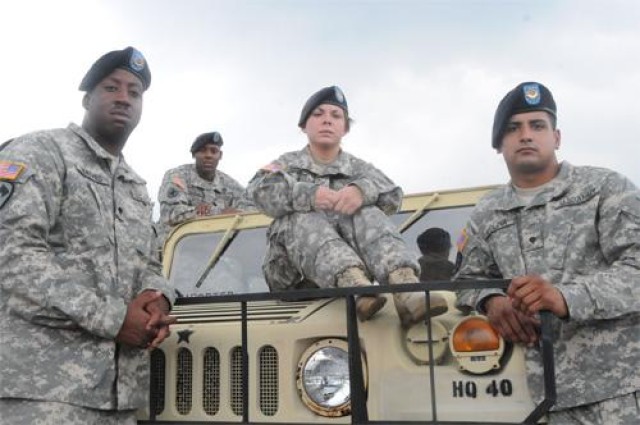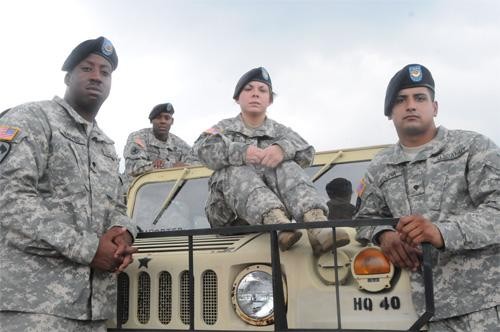
FORT LEE, Va. (Aug. 19, 2010) - Many of the 206 members of the 267th Quartermaster Company, 240th QM Battalion, who deployed to Afghanistan in June 2009 are now trickling in from block leave. The 49th QM Group element deployed at a time when the United States began to ramp up its numbers in the mountainous country while decreasing them in nearby Iraq. Their job, not their doctrinal mission, was to provide convoy security, a dangerous undertaking for any unit - combat arms or otherwise. Their experiences driving armored vehicles from Bagram Airfield to outlying areas yielded everything from personal growth to unit cohesion and a million things in between. The Fort Lee Traveller recently spoke to five Soldiers about their time "downrange." Staff Sgt. Craig Pinckney
Pinckney, who now has three deployments under his belt, served as a section sergeant at Bagram. In the first few weeks of the deployment, he observed that the morale of Soldiers serving alongside him was mixed.
"A lot of them were anxious to figure out what the mission was so we could go ahead and tackle it," said the 28-year-old Daytona Beach, Fla., native. "Some of them were a little afraid of being over there because they had never deployed before."
The Soldiers' enthusiasm moved up a notch when clarity was brought to the mission.
"Soldiers were anxious to go outside that wire," recalled Pinckney. "A lot of them wanted to be gunners (on the vehicles), but you know, everybody can't be a gunner. Or everybody wanted to drive (certain vehicles). Morale definitely improved."
The 267th Soldiers were charged with delivering supplies and equipment to areas as far as 100 miles from Bagram. Pinckney said Soldiers were on the road every other day and sometimes went without sleep for more than a day. The fact that all 206 returned says something about their level of performance, he said.
"All the glory goes to the Soldiers," said Pinckney. "They had long hours, long missions, being on the road 26-27 hours straight with no sleep. They evolved because no matter how much we pushed them, they moved."
In such high-volume, high-stress missions, said Pinckney, Soldiers can transform themselves, emerging as more capable, more mature individuals. That transformation is something to behold, he said.
"It makes you feel good," he said. "These are the people you depend on - those to your right and left. It's a good thing for NCOs and the Army in general."
Spc. Jossue Molina
Molina, from Bridgeport, Conn., grew up in a military family and a competitive one at that.
"I have a lot of cousins in the military, and I was the first one to deploy," he said, noting he now has bragging rights.
And that was his goal as a Soldier when he first arrived at Fort Lee. He said most Soldiers long to put all the training they received in a garrison to use on the battlefield.
"Everything you do here, you want to do out there," he said.
The opportunities abounded. Molina said he participated in about 200 convoy missions, ranging from 11 hours in duration to 26. He said many of them were taxing.
"It takes a lot of energy," said the 23-year-old. "When you get tired, you have to be able to switch positions, know everybody's job in the truck."
Considering a vehicle could be attacked by insurgents or become the target of improvised explosive devices at any time, Molina said a successful mission goes well beyond one's ability to merely perform individual tasks.
"You have to be able to trust the other person with your job," he said.
Spc. Antonio Mathis
The Atlanta native wears a 1st Cavalry Division patch on his right shoulder, the one he earned from a tour in Iraq. The patch is a marker of sorts; one that indicates experience and something that says "look to me for guidance," especially from the perspective of inexperienced Soldiers. Their eyes were especially attentive toward Mathis and his approach to the unfamiliar mission the unit was about to undertake.
"We had a lot of Soldiers in our platoon who had no right-arm patch," said the Army warrior of five years. "A lot of us with that previous deployment experience had to show them the way, lead from the front ... show them that 'Hey, this is how we do it; this is how we overcome and adapt.'"
Mathis' philosophy of survival was put to the test right away. He was involved in an accident that nearly killed him. An RG 31 armored vehicle the 27-year-old was riding in rolled over twice after unstable ground gave way on a hillside. He was riding in the gunner's position when it happened.
"I was partially out of the vehicle when it started to roll," he said. "When they (others in the vehicle) said 'we're rolling,' I dropped (from the hatch). They were strapped down. I'm in the back of the vehicle just hoping that anything doesn't hit me and I don't bounce around in the vehicle.
"That was the scariest 45 seconds of my life."
The incident for Mathis simultaneously reiterated the fragility of life and the probability for misfortune.
"It was inevitable," he said. "All the things that happen in Afghanistan ... you can't think that you're going to run up and down the road and nothing would ever happen to you. It was inevitable that we were going to run into our fair share of it."
Spc. Shannon Bradley
Bradley will part ways with the U.S. Army when her term expires. She is not leaving on negative terms, however.
"I feel like I've done something with my life," the Boston native said. "It was a good experience. I got to meet a lot of people, friends for life."
The time spent together in training and actual missions - through good times and bad - oftentimes create unusually strong bonds and unlikely relationships, said Bradley.
"I'll always connect in some way with my teams," said the 22-year-old, assigned to two different teams during the deployment and driver of the rolled-over vehicle. "My first team was together for only a month. My next team was a staff sergeant and two other specialists, and I and one of them are best friends. We are so different. I would never talk to him if I was just out, but now we have a really strong bond."
The deployment experience wasn't limited to her military mission. Bradley also took note of the inherent cultural divide.
"Just seeing what they go through over there, especially the women," she said. "I honestly don't take anything for granted anymore. We have a lot (in this country) and we don't even know it because we're used to it."
Editor's note: The 206 Soldiers who returned from Afghanistan last month are just a fraction of the total number of 49th Soldiers deployed in the Middle East. There are hundreds serving with more scheduled for deployment in the coming months.

Social Sharing